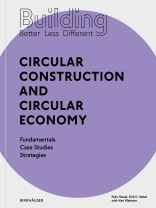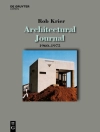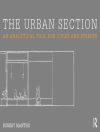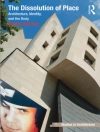Sustainability is to become the guiding principle of social action and economic activity. At the same time, its ways and means are far from clear. As a holistic praxis, sustainability must combine technical and material as well as social, economic, ecological and also ethical strategies, which have multiple complex interactions and all too often also conflicting goals and priorities. In no other field can these be better observed, addressed and influenced than in architecture and building.
Each volume of ‘Building Better – Less – Different’ details two fundamental areas of sustainability and explores their specific dynamics and interactions. After introductory overviews, innovative methods and current developments are described and analysed in in-depth essays, international case studies and pointed commentaries. The sustainability criteria of efficiency (‘better’), sufficiency (‘less’) and consistency (‘different’) form the framework for each book.
The first volume presents concepts, methods and examples of circularity in construction and the economy. Urban mining and circular construction are two approaches to the challenges that architecture and urban design are facing, using techniques such as mono-material construction and design for disassembly, and tools such as materials passports and databases. The circular economy is not solely about recycling but encompasses a wide range of strategies from local community projects to new ownership and service models and steering mechanisms such as carbon fees and dividends.
विषयसूची
From the Contents
Sustainability – The Importance of a Holistic Approach
Principles of Circular Construction
Principles of a Circular Economy
Better:
Better – Efficiency in the Construction Industry
The Case for Deconstruction
Building Capacity and Knowledge in the Local Economy
New Buildings from Old
Deconstruction of Place, Acceleration of Waste
Better – Moving towards Eco-efficiency
Reuse Infrastructure
Deconstruction Policy in Portland, Oregon
Less:
Less – Sufficiency as Innovation
Strength Through Geometry and Material Effectiveness
Less – Moving towards Eco-effectiveness
The Economy of Urban Mining
Carbon Fees and Dividends, and a Circular Construction Industry
Towards a More Responsible Society with the Polluter Pays Principle
Different:
Different – Consistency as a Principle
Ecology Must Have Priority!
The Kendeda Building for Innovative Sustainable Design
Triodos Bank
Concular
Materials Passports
The Urban Village Project
Different – Moving towards Disruptive Innovation
Cooling as a Service (CAAS)
A Circular Approach in Flooring
Be Careful What You Wish For
Better + Less + Different:
The Urban Mining and Recycling (UMAR) Unit
लेखक के बारे में
Felix Heisel is an architect working towards the systematic redesign of the built environment as a material depot in a continuous cycle of use and reconfiguration. He is an Assistant Professor at the Department of Architecture at Cornell University’s College of Architecture, Art, and Planning, where he directs the Circular Construction Lab. Heisel is one of the founding partners of the Circularity, Reuse, and Zero Waste Development (CR0WD) network in New York State, as well as a founding partner of 2hs Architekten und Ingenieur Part Gmb B Hebel Heisel Schlesier, Germany, an office specializing in the development of circular prototypologies. He has received various awards for his work and published numerous books and articles on the topic, including Urban Mining und kreislaufgerechtes Bauen (‘Urban Mining and Circular Construction’) (Fraunhofer IRB, 2021, with Dirk E. Hebel), Cultivated Building Materials (Birkhäuser, 2017, with Dirk E. Hebel) and Building from Waste (Birkhäuser, 2014, with Dirk E. Hebel and Marta H. Wisniewska). Felix Heisel graduated from Berlin University of the Arts and has taught and researched at universities around the world, including the Berlage Institute, the Ethiopian Institute of Architecture, Building Construction, and City Development, the Future Cities Laboratory, Singapore, ETH Zurich, and Harvard GSD.
Dirk E. Hebel is Professor of Sustainable Construction and the Dean of the Department of Architecture at the Karlsruhe Institute of Technology (KIT), Germany. He is the author of numerous book publications, including most recently Urban Mining und kreislaufgerechtes Bauen (‘Urban Mining and Circular Construction’) (Fraunhofer IRB, 2021, with Felix Heisel). He is co-founder and partner of 2hs Architekten und Ingenieur Part-Gmb B Hebel Heisel Schlesier, practicing architecture with a focus on resource-respectful construction methods and materials. His work has been shown in numerous exhibitions worldwide, most recently in Plastic: Remaking our world, Vitra Design Museum Weil am Rhein (2022) and Environmental Hangover by Pedro Wirz (both with Nazanin Saeidi, Alireza Javadian, Sandra Böhm and Elena Boerman), Kunsthalle Basel (2022), as well as Sorge um den Bestand, BDA, Berlin and other venues (2020–). As Faculty Advisor together with Prof. Andreas Wagner, he won the first Solar Decathlon Competition 2022 held in Germany (Wuppertal) as part of the Roof KIT team (Regina Gebauer and Nicolas Carbonare).
Ken Webster is a Visiting Fellow at Cranfield University and was formerly Head of Innovation at the Ellen Mac Arthur Foundation. His book The Circular Economy: A Wealth of Flows (Ellen Mac Arthur, 2nd edition 2017) relates the connections between systems thinking, economic and business opportunity and the transition to a circular economy. He is on the Club of Rome‘s Transformational Economics Commission and a contributing author to Earth For All (2022). He makes regular inputs to conferences, workshops and seminars around the world.












